
COMRADES is creating a community resilience platform to help communities to reconnect, respond and recover from crisis events (e.g. floods, hurricanes, earthquakes, wildfires etc.). Continue reading “COMRADES Project”

COMRADES is creating a community resilience platform to help communities to reconnect, respond and recover from crisis events (e.g. floods, hurricanes, earthquakes, wildfires etc.). Continue reading “COMRADES Project”
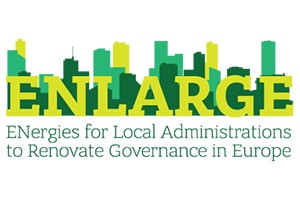
ENLARGE focuses on the effectiveness, legitimacy, and institutional sustainability of collaborative processes in the field of sustainable energy. Continue reading “ENLARGE Project”

We are glad to announce a fresh collaboration with the COMRADES project and welcome it to our network! The COMRADES project will create a community resilience platform to help communities to reconnect, respond and recover from crisis events (e.g. floods, hurricanes, earthquakes, wildfires etc.). Continue reading “FLOOD-serv welcomes the COMRADES project to its network”
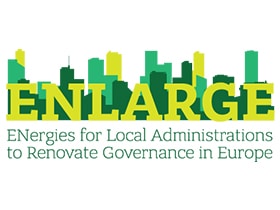
The FLOOD-serv communication team is pleased to announce the establishment of a cooperation with the EU funded project ENLARGE. Continue reading “FLOOD-serv join forces with ENLARGE”

Ivica Matošová, Project manager of the EU project department at the Bratislava self-governing region. After graduation from the Alexander Dubček University of Trenčín in the field of Public administration has been working as a project and financial manager for a consultancy company (SME) as well as for the public sector. More than 13 years’ experience and skills in preparation and implementation of the European projects.
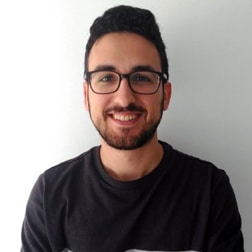
Sergio Castro is Multimedia Engineer from the University of Alicante (2017). Developer and software designer who participates in all phases of a software project. He is specializing in Web and mobile technologies. He has worked in the development of different kind of projects that include web and cross-platform mobile applications. He worked for other companies making Web services. At Answare he started working in the European FLOOD-serv H2020 project, developing the web and mobile applications.

Raquel Yuste is Multimedia Engineer from the University of Alicante (2017). Developer and software designer who participates in the front-end part of a software project. Specialized mainly in Web technologies, design and prototype of applications. She has worked in the development of different kind of projects that include web and cross-platform mobile applications and also has worked on other projects as a designer. She started working in the sector in 2015 and after two years in different companies, she joined at Answare in 2017, where she is collaborating as a developer and designer in the H2020 FLOOD-serv project.
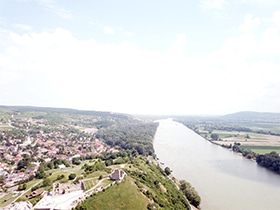
The municipality of Bratislava Devin will take part in piloting and testing the FLOOD-serv system in Bratislava region as it is located at the conflux of two major rivers, Danube and Morava. This fact makes the area prone to river flooding with the latest one occurred in June 2013. Continue reading “UAVs and FLOOD-serv testing in Bratislava”
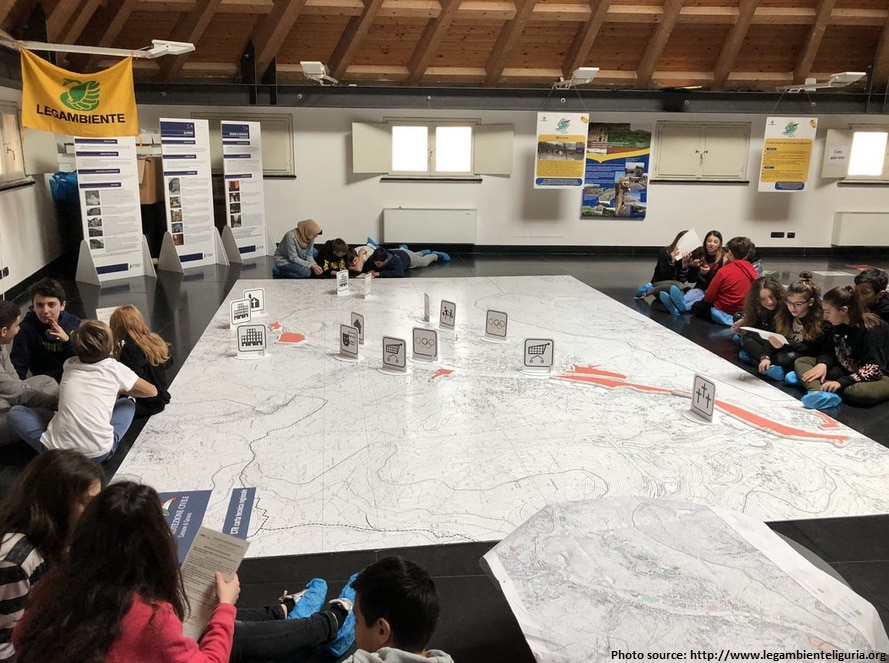
Lega Ambiente Liguria ONLUS Association with the Civil Protection of Municipality of Genoa, had organised an Exhibition and and a workshop “Genova e il rischio idrogeologico” from 15th January to 23th March 2018, for children to raise their awareness about the hydrogeological risks. Continue reading “Lega Ambiente Association: Activities to inform citizens of Genoa about the local hydrogeological risks 🗓”
After the completion of the technical aspects, FLOOD-serv pilots are ready to be demonstrated and tested by citizens, public authorities and other stakehoders in Italy, Portugal, Romania, Spain and Slovakia. On the one hand, these meetings with the end users will enable pilot leaders to explain the services offered by each pilot and, on the other hand, the end-users’ feedback is expected to be valuable so that it can be assessed and then used to fine-tune each component of the developed system. Stay tuned for updates!
Tomas Koren, representing Exdwarf in FLOOD-serv consortium, had a couple of very interesting exploitation meetings in Tel Aviv, Israel last January. In detail, he presented FLOOD-serv project with Simone Leibovich (EU Programmes Manager) at Tel Aviv – Yafo Municipality on January 24th and with Gili Shenhar, EMBA (Academic coordinator, Department of emergency and disaster management) and Bruria Adini, PhD. (Academic coordinator, Executive international Master’s program in disaster management) on January 25th at Tel Aviv University.
It is important that both institutions expressed interest in our project not only in urban/tsunami flood but also in broader emergency management context. Although urban flash floods are quite ordinary phenomenon to experience there (especially in winter months), Tel Aviv also faces tsunami challenges. However they have no system in place for this type of emergency. Both of these institutions are open to test the piloting version of the project once it is ready, so more action to come!
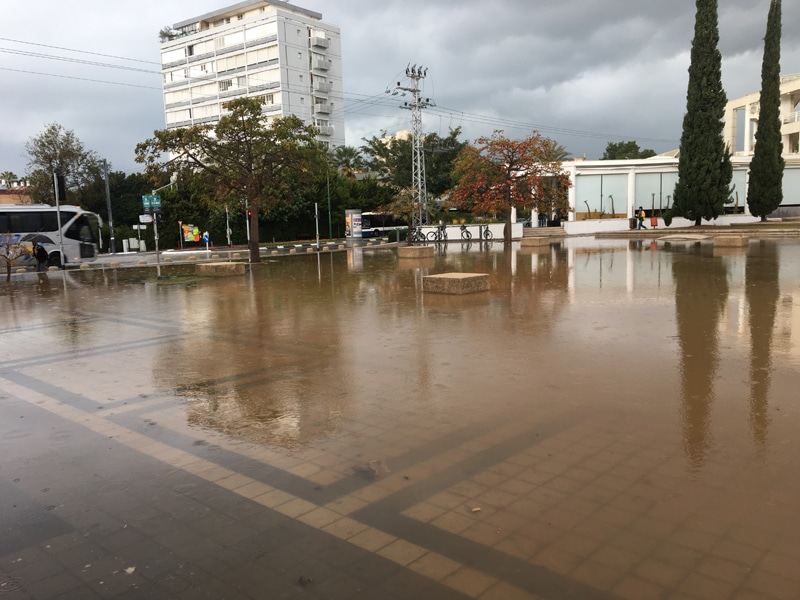
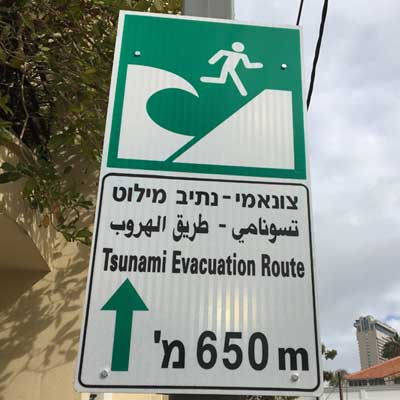
Five countries – Romania, Spain, Slovakia, Portugal and Italy – involved in the FLOOD-serv project with respective pilot cities per each are assigned to test and evaluate a platform for emergency and territorial services management. The pilot cities have been chosen in such a way that different hydrological realities and management situations are represented.
The city of Genoa, for example, decided to work more specifically on a citizens’ awareness-raising theme both on the hydrogeological risk prevention and the involvement of social actors in the Public Administration. The City of Genoa has shown a long-term interest in the sustainable development and the search for a solution based on ICT technologies, as demonstrated by the creation of the Genoa Smart City Association (AGSC) in 2010 and the constant participation in environment-themed EU Projects as a tool for the transformation of the city.
The Genoa project has worked and will continue to work focusing on the ‘pre’ and ‘post’ emergency management, testing new early warning procedures and interoperating with the city’s system of geo-referenced data actually stored in the Cartographic Geo-Portal. For this purpose the Ligurian pilot activities point to a better involvement of the citizens in different levels.
A participatory process with the latter aims to use the gathered data to improve the existing services performance, contribute to the creation of new services with a bottom-up approach, as well as with useful information and personalized services. Lastly, the experimentation and testing of the portal want to offer concrete help towards the creation of social exchange networks and mutual help among territorial associations, independent citizens, private companies and public administrations in order to form, thanks to the FLOOD-serv project, a heritage of shared knowledge, expertise and new social relations.
Following an approach already successful in other contexts, citizens are called to take active part in the gathering of data and territorial information useful to prevent and manage emergency flooding situations. By this way it would be possible to nurture habits which could build better urban resilience in potential disaster areas. In addition, the new services could be employed not only in creating but also in strengthening ‘people networks’. In other words, citizens will be able to self-organize and prepare themselves to act both before and after an emergency.
Genoa’s pilot experimentations, established and shared with all partner cities and countries, focus on the ‘pre’ and ‘post’ emergency, since Italy already has a clear protocol of engagement – managed by the Protezione Civile (Civil Protection) – which becomes operative and paramount during the hydrogeological or environmental emergency phase. In Italy the only authority authorised to decide and act during an emergency is the Civil Protection System. It is an integrated system of institutional bodies, structures and operative forces that coordinates the policies and activities on the theme of defence and civil protection, and that acts on a local, provincial, regional and state level, performing the basic functions of forecast, prevention, rescue, help and then the post-emergency phase as well as the return to normal in the stricken areas. (1)
The FLOOD-serv project can contribute to the community not only in the emergency management area, which is processed through established procedures and protocols, but also in prevention and territorial monitoring before a flood event occurs.
Moreover, it contributes to the ‘back to normal’ phase when the actual emergency is over but there are still difficulties and uncertainties. This focus of the pilot project has been discussed, not just between the project partner and their external consultants, but also with the Civil Protection operatives, who support and encourage any experiment and research which can give useful indications for the ‘pre’ and ‘post’ emergency phases.
In the last few months the Genoa team has worked on the first experimentation phase by organizing a ‘pre-test’ of citizens’ interaction. The ‘pre-test’ started at the beginning of November and lasted till the end of December 2017. It was carried out by volunteers and citizens marked by professional expertise and territorial knowledge. The goal was to understand, together with the administration, what and how citizens could communicate with the Administration for a better prevention of flood risks. Specifically, users were asked to experiment communication through an Open Source app, modified by the Geopaparazzi app for the gathering of data on the field, and personalised by the Geomorfolab of the University of Genoa (DAD Department) in an app for signalling potential crisis spots in case of hydrogeological risks, provocatively called MUGUGN.APP.
This smartphone app has two operational procedures: one ‘free’, where the user can insert a text and can include a photo; and one ‘guided’ which, through a series of drop-down menus, guides the user to compile an ad hoc scheme to interface directly with the actual data scheme of the City of Genoa Geo-portal.
Both modalities answer to the main goal of this early test. They test the possibility of a future two-way communication citizen/administration. On the one hand, the ‘guided’ information from the public is operational to the optimization of the interoperability with the current data structure of the Municipality (Comune); on the other hand, the possibility of ‘free’ information from the public allows to discover unknown or unconsidered situations, and to use a language in which is easier for the ordinary citizen to describe what he or she has seen. Moreover, it also allows the possibility of free suggestions or ‘mugugni’ (2) on the topic, useful to the institution responsible for monitoring the potential crisis areas.
In this early stage several kinds of users were involved such as:
This ‘pre-test’ activity was based on the concept that any insight coming from the evaluation and analysis of data and procedure would be quite useful in designing a method for the active involvement of citizens. This method will be used in the next experimentation phase of the platform and the services connected with it.
In the following months the platform developed by FLOOD-serv technical partners will be tested in all pilot cities of the project. For this reason, reflecting carefully on the data gleaned by the ‘pre-test’ would enable the working group of the Municipality of Genoa (Commune di Genova) and the external consultants to better structure the real test phase.
At this point, the modest participation of users involved through the training meetings in the “pre-test’ revealed some weaknesses which will be encountered during the actual platform testing. However, the lessons learnt during this “pre-test” phase are considered as strengths for the upcoming actions.
It is clear that on the one hand, it is necessary to identify new stakeholders interested in the problem and willing to really engage in the platform testing. On the other hand, we should ascertain that the tools to be used in communicating between citizens and the administration must be user-friendly and easy to understand so as to catch the attention of the users, like the interest and curiosity for the mugugnapp during the ‘pre-test’.
Conclusions
Genoa’s choice to focus on citizens’ involvement in regard to hydrogeological risk prevention is neither caused by a strong local tradition of citizens’ participation, nor motivated by a particularly intense time of active involvement.
Given the importance of involving citizens in the preservation of their territory and regarding the lack of national legislations about citizens’ participation, the City of Genoa considers the FLOOD-serv European project as a good opportunity to experiment on citizens’ involvement processes in the handling of a public interesting topic like the pre- and post-hydrogeological event.
Moreover, the communication that has already established with the citizens during the pre-test phase, and will further expand during testing the FLOOD-serv platform, could act as a useful communication channel among them and the Civil Protection during emergencies. In this context effective procedures and operational methodologies in pre and post emergency situations could also be defined.
Concluding, projects funded by the European Commission like the FLOOD-serv, can be seen as a great opportunity to confront several different aspects of citizens’ involvement, without omitting the fact that can assist in raising the awareness of the local community about:
(1) The Civil Protection Department was established by the Law 24/2/1992 n.225 for the national level prevision, prevention, management and the follow-up to calamities and disasters both natural and human, emergency situation. It also has the responsibility for Hydrogeological Risk and Forest Firefighting. Through the years its structure has been changed, especially on the topic of local responsibilities, but not its goal and duties.
(2) Typical expression of the Ligurian dialect. It means the local inclination to whine in every occasion and express discomfort and protest; a rather annoying attitude on the long run but usually indulged as typical local trait.
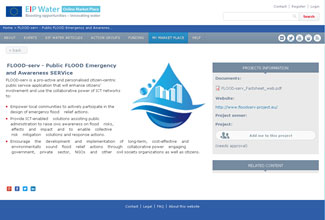
The FLOOD-serv project promotes its innovative solution through major channels affiliated to water related innovation. The EIP website featured the project at its website and within the March newsletter issue. The EIP on Water newsletter has more than 5,000 recipients with most of them active in the topic.
The European Innovation Partnership on Water – EIP Water in short – is an initiative within the EU 2020 Innovation Union. It facilitates the development of innovative solutions to address major European and global water challenges. At the same time, the EIP Water supports the creation of market opportunities for these innovations, both inside and outside of Europe. Lastly, it aims to remove barriers by advancing and leveraging existing solutions.

Representatives from our consortium, including the project coordinator, attended the event “Digital Transformation of Public Administrations Event” that was organized by the Directorate General for Communications Networks, Content and Technology (CONNECT) and the Research Executive Agency (REA). The event was held in Brussels on the 24th October 2017. It brought together 100 persons from a large spectrum of stakeholders, including project representatives, public administration representatives, EU policy makers and professionals active in the investment and start-up community. New opportunities for further expanding our project’s network were explored and new synergies were established. Also valuable information and suggestions around the exploitation activities that EU funded projects in general may follow were collected.
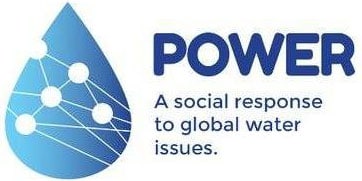
Throughout our project’s lifecycle the communication team approaches other EU funded projects for expanding the FLOOD-serv network. This network contributes in the promotion of our results. In this context we established cross links collaboration with Power project.
The project “Political and sOcial awareness on Water EnviRonmental challenges” (POWER) is an EU funded project under the call H2020 call which started in December 2015. It supports cities throughout the world to improve their water management to modifications caused by climate change and urbanisation. The project aims to set up an interactive Digital Social Platform (DSP) for the expansion and governance of existing water networks. This is reached by engaging on a large scale with stakeholders in the co-creation and delivery of digital products and services to citizens involving awareness-raising, new policy initiatives and deployment.
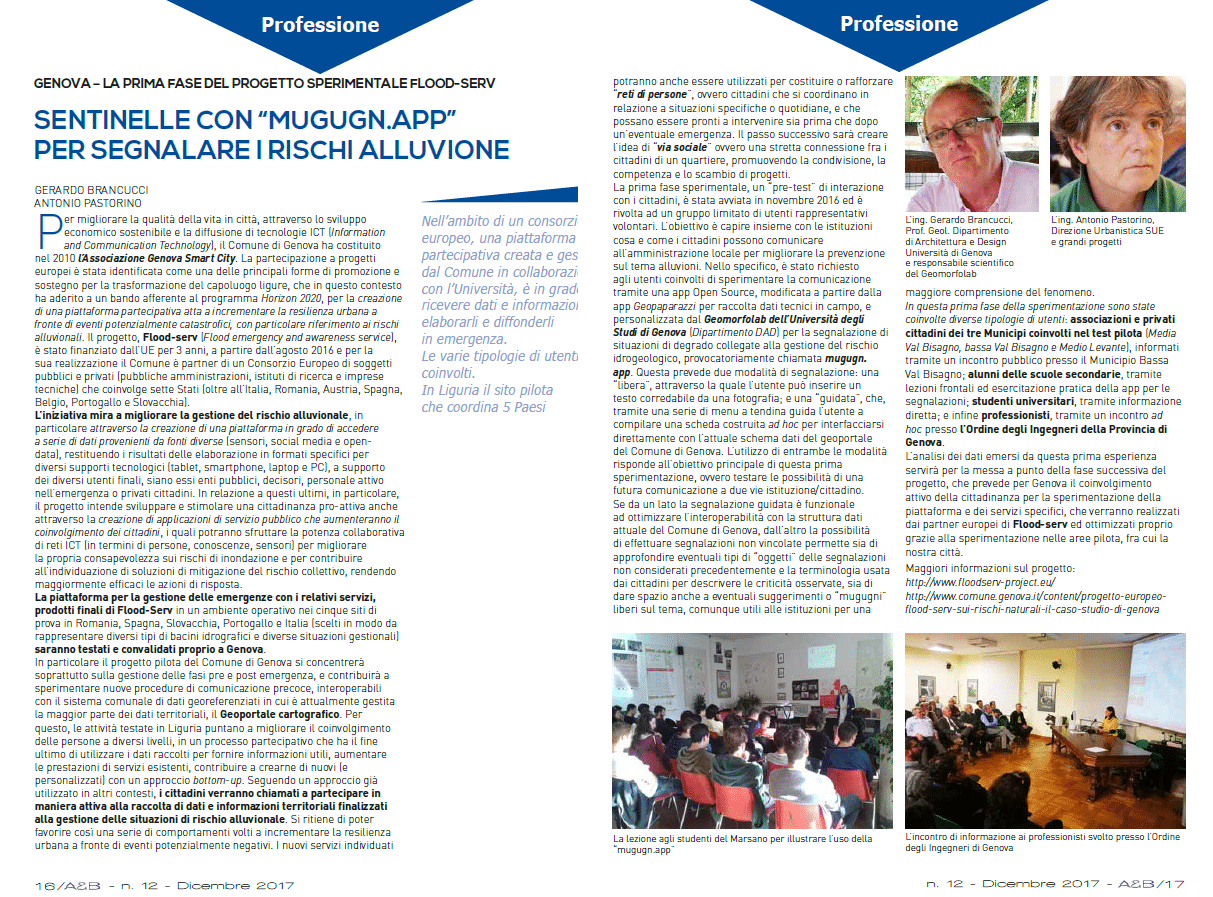
Within a European consortium, a participative platform created and managed from the Comune di Genova in collaboration with the University, is able to receive data and information, process and disseminate them in an emergency. The first experimental phase, a “pre-test” of interaction with citizens, was launched in November 2016 and was addressed to a limited group of representative users volunteers. The goal is to understand together with the institutions what and how citizens can communicate to the local administration to improve prevention on the theme of floods.
Specifically, it was requested users involved to experiment with communication through an Open Source app, modified starting from Geopaparazzi app for technical data collection in the field, and customized by the Geomorfolab of the University of Studies of Genoa (DAD Department) for the reporting of degradation situations related to risk management hydrogeological, provocatively called mugugn.app.
This provides two ways of reporting: one “free”, through which the user can enter a text that can be accompanied by a photograph; and a “guided” who, through a series of drop-down menus guides the user to fill in a form built ad hoc to interface directly with the current geoportal data scheme of the Municipality of Genoa. Use of both modes responds to the main objective of this first experimentation, or tests the possibilities of one future two-way communication institution / citizen.

Mugugn.app, developed by the Department of Architecture in Genoa and designed by the University of Genoa, serves to report areas or elements of the city at potential hydrogeological risk. The article that outlines that from the unsafe wall to the manhole filled with leaves: the system collects and immediately geolocates the flaws of those who use it and then transmit them to a portal that collects them.

The FLOOD-serv has built a community consisted by experts on hydrological hazards, mayors across European Union, citizens who are willing to test the demo FLOOD-serv platform, members of civil protection in pilot sites and so on. Would you like to get involved? If yes, you can be part of our LinkedIn Group or/and Facebook Group. As a member you can provide your feedback to the technical partners of the project as a potential end-user and help us make a better product! Express your interest!
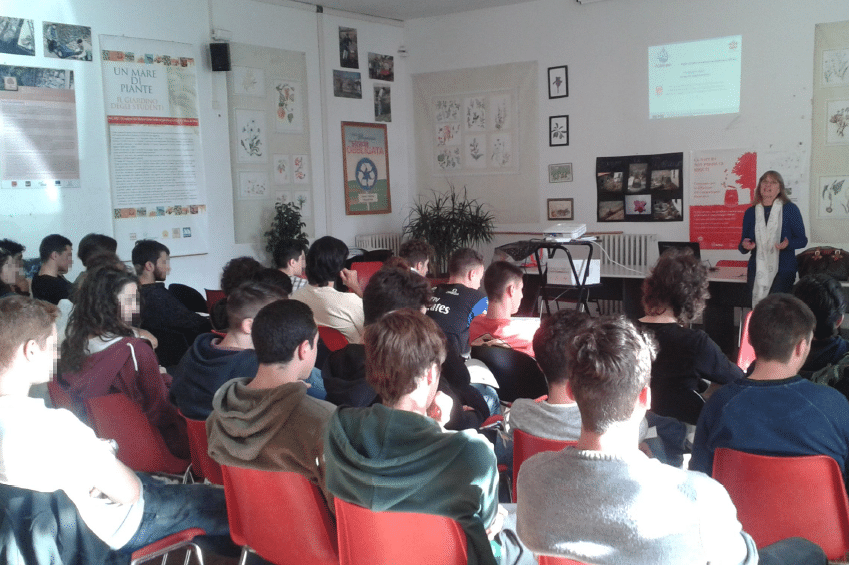
The municipality of Genova has organized a series of presentations (PRE-TEST app technical presentations) about the Genova pilot with great success from November to December of 2017.
In this context, our partner from Comune di Genoa organised a pre-test app technical presentation in collaboration with UNIGE from November 21st to December 15th, 2017 at Istituto Professionale Tecnico Agrario “Marsano”. The aim of the demonstration was to present the activities and the output of the Genoa Pilot project and the PRE-TEST app (Mugugn.app). 61 students of “Marsano” (n. 2 IV class and 1 V class) participated and learnt more about the project and the pilot.
Series of presentations during the pre-testing phase in Genoa
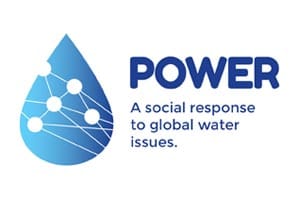
The project “Political and sOcial awareness on Water EnviRonmental challenges” (POWER) is an EU funded project under the call H2020 call which started in December 2015. Continue reading “POWER project”
Workshop for around 100 public authorities and businesses, organized by ANO
Workshop for around 100 public authorities and businesses, organized by ANO
The IADIS Information Systems Conference (IS 2018) aims to provide a forum for the discussion of IS taking a socio-technological perspective. It aims to address the issues related to design, development and use of IS in organisations from a socio-technological perspective, as well as to discuss IS professional practice, research and teaching.
You can read more about the event here
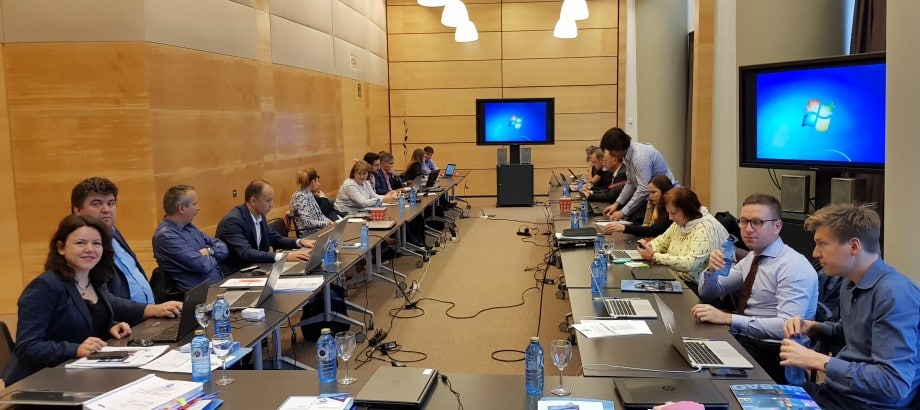
On the 27th of October 2017 the consortium partners met in Bilbao (Spain) for presenting the work performed during the first year of FLOOD-serv. The meeting was also attended by experts on the project’s topic assigned by the Research Executive Agency (REA) who assessed the course of actions made by each partner.
Links to media:
Presentation of the study “Flood Services needs in the context of Danube Delta area flood risk management – Flood Serv Project”
SCEWC international summit of discussion about the link between urban reality and technological revolution
Barcelona, Spain
The Danube Delta Institute for Research and Development Tulcea organizes the 26th Symposium “DELTAS AND WETLANDS”. The event will take place from the 16th to the 20th of May in Tulcea, Romania.
You can read more about the event here
ISCRAM is a global community of academic researchers and practitioners. The annual international conference is a premier international venue for the dissemination of peer-reviewed research and lessons learned from all aspects of information systems for crisis response and management. Topics of interest to ISCRAM include, but are not limited to: crisis informatics, geographic information systems (GIS), human-computer interaction, humanitarian information management, situation awareness, visual analytics, social media, serious games and more. We are particularly interested in conference participation from students and attendees from developing countries.
You can read more about the event here
The annual conference of Major Cities of Europe will be hosted and organized together with the Municipality of Leipzig from 28.5.2018 to 30.5.2018 at the Kongresshalle. The overarching theme of the conference is “Are we ready? Taking the digital city to the next level”
For more than 35 years, Major Cities of Europe – MCE – has been engaged in promoting the exchange of experiences among cities related to the cities innovation by leveraging Information and Communication Technologies.
You can read more about the event here
The i-Society 2018 is a global knowledge-enriched collaborative effort that has its roots from both academia and industry. The i-Society conference covers a wide spectrum of topics that relate to information society and artificial intelligence (AI), which includes technical and non-technical research areas.
You can read more about the event here
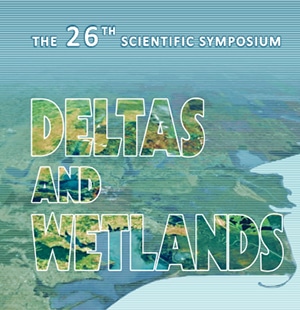
It is our pleasure to announce you that “Danube Delta” National Institute for Research and Development will organize the 26th International Symposium “Deltas and Wetlands” 2018 which will be held in Tulcea, Romania between 16-20 May 2018. We invite you to join us to the event. Please send us the Registration Form till 1st March 2018.
After the reviewing process, the papers will be published in the journal: Scientific Annals of the Danube Delta Institute, indexed in the ICI Journals Master List.
You can find out more about the Symposium by clicking here
ICT Proposers’ Day 2017 will take place on 9 and 10 November in Budapest, Hungary. This networking event centres on European ICT Research & Innovation with a special focus on the Horizon 2020 Work Programme for 2018-20. An Opening Ceremony and Social Event will be organised by the Hungarian Ministry of National Development and will take place on 8 November.
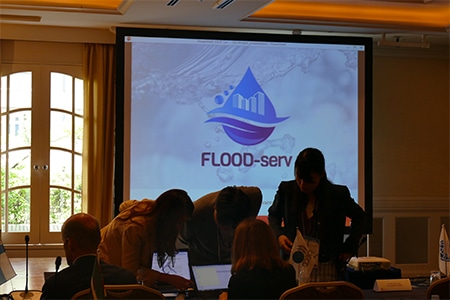
The project was discussed among Breakout Group 4 during Sessions VI and VII on Interaction Day of the 51st ICA International Conference which took place in Tokyo, Japan September 11th-14th. Gov2u partner member, Dora Spyropoulou attended the conference and discussed the possibilities of FLOOD-serv during discussions addressing the topic of misinformation and dealing with Disaster Management situations.
The Conference themed Bold Digital Government-dealing with disruptive technologies was attended by international governmental CIOs from a number of countries from around the world as well as local stakeholders and national ministerial representatives.
For a full view at the conference highlights visit here
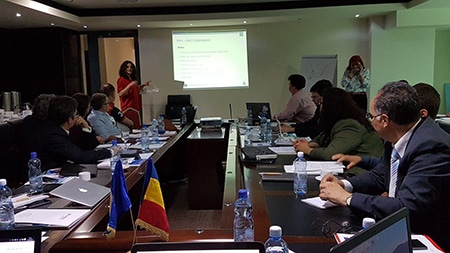
The FLOOD-serv team gathered in Tulcea city, Romania from 11th to 12th of May 2017 where it discussed about the progress of the project and planned its next steps. In this photo our partners from Answare present the Emergency Management Console (EMC).
More photos from the FLOOD-serv meeting in Tulcea can be found below:
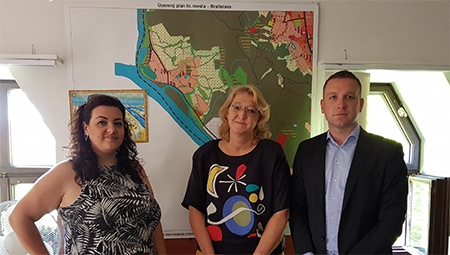
After meeting the Mayor of Bratislava Devin, Mrs. Lubica Kolkova, Katarina Vargova (BSK) and Tomas Koren (Exdwarf).
Devin municipality has been exposed to confluence of two major rivers of the region – river Danbue and river Morava. Last major flood hit the region in June 2013 and caused several damages. Bratislava Devin will be testing the FLOOD-serv Project EU platform in Slovakia.

The FLOOD-serv Communication and Dissemination team proudly announces the establishment of a brand new collaboration with the Mobile Age project!
Both projects are EU funded under the same call and at this phase, FLOOD-serv and Mobile Age will share experiences and news with their networks. In future they will explore together the organization of possible joint dissemination activities such as workshops.
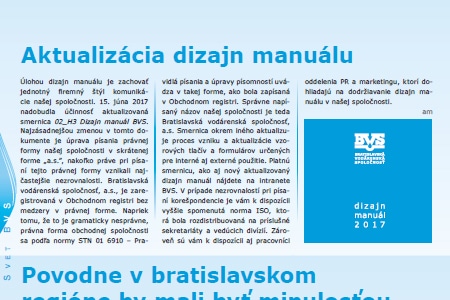
FLOODS IN THE BRATISLAVA REGION SHOULD BE PAST
The Bratislava Water Company and the Bratislava Self-Governing Region are part of the international project “Public Flood Emergency and Awareness Service”, linking local and national alarm systems with social networks as well. The county will receive 65,000 euros to launch the project, and volunteer reporting will be part of the alert system.
In this unique project will be the possibility of creating a direct communication channel between the water company and the designated persons in the area affected by the floods. The Bratislava Water Company will also obtain the necessary information on the development and prediction of a possible flood situation in order to ensure the available technical measures to minimize the risks. “The aim of the FLOOD-serv project is to develop, test and then put into practice a unique innovative warning system that will be distributed throughout the world after testing. The Bratislava Self-Governing Region has minimum two experiences with centuries-old water in the last 6 years. Whether in 2011 in Pila village or in 2013 in Bratislava.
It is our moral duty to engage in any activity that can escape such disasters and warn people. We are able to protect not only the property but also the lives of the peoples, “said Mr. Pavol Frešo, the president of the Bratislava Self-governing Region.”
The original article is in Slovak and you can find it here.
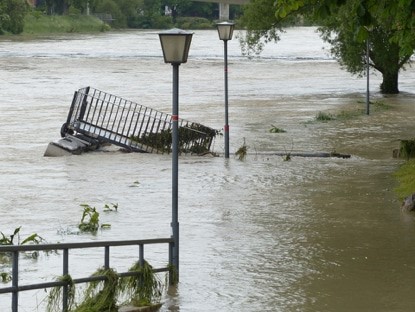
The summer of 2016 kicked off with heavy rainfall that caused major flooding. Many cities in* Europe saw housing and streets flooded, while debris lingered for long thereafter*. The areas mostly affected were Germany and France, but also Austria, Belgium, Romania, Moldova, the Netherlands and the United Kingdom. A number of cities in these regions were faced the emotionally and economically drowning effects of floods. Areas such as the German states of Bavaria, Hesse, Rhineland-Palatinate, Baden-Württemberg, and North Rhine-Westphalia all suffered the harsh consequences that severe floods bring along. At their source, rivers Neckar, the Danube, Rhine and Seine displayed excessively high levels of water which carried the flood on to their branches and along their banks.
Socio-economic Impacts of floods
It goes without saying that flooding can result in damage of possessions and harvest but also bring about infectious diseases and even worse, the loss of human life. Moreover, any kind of economic activity may come to a halt because of disruption and possible damage to infrastructure and transportation networks such as roads and bridges. In many cases residents are forced to flee from their homes and their everyday lives to be spared of the aftermath following the floods.
Consequently, damage to industry can cause the loss of livelihoods; not only at a financial level but at the level of bare necessities. This type of damage can result in long-term impacts such as limited supplies of clean water, wastewater treatment, loss of electricity, transport and communication and limited health care supplies.
Psychological Impact of floods
Floods do not only damage property – they damage lives. The psychological impact that follows exposure to natural disasters such as floods results in a range of different symptoms. The loss of loved ones has deep impact, especially on children. Displacement from one’s home, loss of property and disruption to business and social affairs can cause continuing stress. For some people the psychological impacts can be long lasting.
According to a study conducted by the Department of Psychological Sciences of the University of Worcester (written by Mason V, Andrews H. and Upton D) individuals who have experienced a flood can display symptoms of post-traumatic stress disorder (PTSD), depression and anxiety.
Most frequently the people who took part in the study reported *“coping strategies were rational, detached and avoidant, with the least frequent being emotional coping. Having to vacate home following flood, previous experience of flooding and poor health were associated with greater psychological distress. Detached coping appeared to be related to less distress”. *
Standing up to the disastrous effects of floods
The overall objective of FLOOD-serv is to offer a pro-active and personalized public service application that will encourage the involvement of the citizens in risk reduction actions through the collaborative power of ICT networks.
In order to fight floods and their catastrophic effects* local communities need to become stronger and empowered*. With the utilization of new technologies (e.g. social media and mobile technologies) citizens can become more aware regarding flood risks and take part in the design of emergency services that deal with disaster management actions against floods.
Of course, the development and implementation of risk reduction actions requires the cooperation of many different sectors. The government, private sector, NGOs and other civil society organizations as well as citizens will need to work together in order to measure the potential impact of floods, warn the citizens and prepare the recovery plan for such events.
The FLOOD-serv project aims to offer an effective opportunity for collective problem solving, knowledge sharing, social exchange and community-wide participation at local and global scale. This will help gain insights and ensure that local communities are prepared and have developed solid risk reduction solutions.
In order to aid communities in their efforts to overcome the disastrous effects of floods the project partners will create and test the flood awareness and resilience techniques in five pilot areas: Slovakia, Genoa Municipality, Bilbao, Vila Nova de Famalicão and Tulcea.
Conclusion
It is of utter importance to create communities resilient to hazards by preparing for these threats and enhancing the ability of these communities to absorb impacts and keep evolving. Preparedness will reduce the negative impacts of hazards and save lives that would be otherwise lost in disasters. It will also secure the economic stability of these communities, and support the health of our coastal ecosystems, including wetlands which are essential for reducing storm impacts on coastal communities.

Haizea Barandika was graduated at the Architecture University of the Basque Country, and has a Master in Participation and Community Development and postgraduated studies in Urban Planning. She has been working in the Ayuntamiento de Bilbao since 2012, first in Urban Planning Section and since 2014 in Civil Protection. Previously she worked in several Architecture Studios.
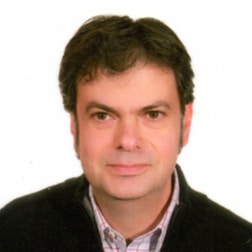
Ignacio Gil was graduated at the Architecture faculty of the Polytechnic University of Madrid in 1991. He is for the time being Deputy Manager of Civil Protectionin the Council of Bilbao. From 1995 to 2001 he was responsible of Public Promotion Housing in the Basque Government. From 2001 on he has been working for the Council of Bilbao in several managerial jobs.
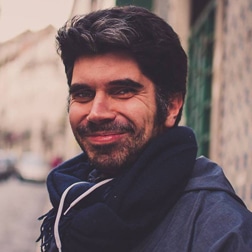
Pedro Leite is the International Business Developer and International Project Manager of ANO Software. Responsible for FP7/H2020 and national level projects, he acts as a project manager, technical consultant and team leader. He is also the Project Manager and Team Leader within the Engineering Department of ANO Software, responsible for developing and coordinating the team behind the CMS and eGov system, and has a vast experience in Oracle Forms and Reports, PL/SQL, Java and .NET projects. Pedro graduated from the University of Porto in 2006, in Electrical and Computer Engineering and holds a Masters in that field, with a major in Telecommunications, and a specialization in Multimedia. He did in 2016 a postgraduate in Sales Management at the Porto Business School.
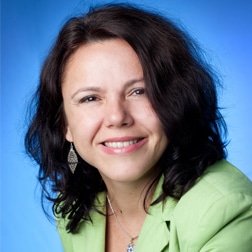
Dr. Monica Florea acts currently as Head of the European Projects Department in SIVECO Romania, leading SIVECO participation in various R&D projects under Horizon 2020, FP7, FP6, LLP, ITEA, and AAL programmes. Her duties include the coordination of SIVECO projects co-financed by European Commission and collaboration with national and international bodies in the framework of European Union programs. She has two degrees: Computer Science and Finance and Banks, an MSc in Distributed Processing, a PhD in Management, a PMP certification and Management of Risk Practitioner certification. She is also Project Manager in many European and national R&D projects, responsible for the management, Quality Assurance and Risk Management Strategy.
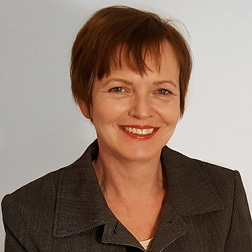
Susanne Sonntagbauer is a senior consultant in Cellent AG (AT) with nearly 30 years of experience in the fields of project management and consulting. She has a long term experience in project management including collaborative projects with multiple partners as well as consulting for public bodies and private companies. Her educational background includes three major areas: economics, political science and IT. She is a graduate of the Vienna Business School (HAK), finished a postgraduate study of the federal technical institute for IT (HTL) and holds a PhD in applied political science.

Tommi Tervonen is Exdwarf Co-founder and Senior Advisor responsible for service delivery within the company. Tommi holds a double doctoral degree in Computer and Management Sciences (University of Turku, Finland / University of Coimbra, Portugal). He is a renowned expert in multi-criteria decision analytical approaches with extensive experience in software development, both in development team management and in implementation. In addition to his responsibilities in Exdwarf, Dr Tervonen serves as a scientific consultant at Evidera and is an Associate Editor for Decision Support Systems, an A-level information systems journal. He has previously held a position at the Erasmus School of Economics of Erasmus University Rotterdam.
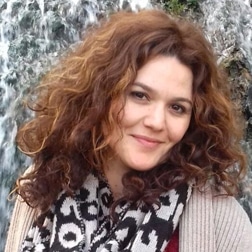
M. Victoria Moreno is a Telecommunications Engineer from the Technical School of Telecommunication Engineering of Cartagena (Spain). Victoria got the Ph.D degree in Computer Science in 2014 from the University of Murcia (Spain). She has been working for two years (2015-2017) as a Postdoctoral Researcher in Germany. Her main research interests include data analysis and modelling applied to areas of smart cities like energy efficiency in buildings, being this the topic of her doctoral thesis. She has experience on both the public and private sector, and she has participated in numerous research projects, both at national (EDISON, MOWIS, AIRE, etc.) and European level (Horizon2020 ENTROPY, FP7 SMARTIE, FP7 SOCIoTal, etc.). She joined Answare in 2017 to provide scientific support and participate in different research projects.
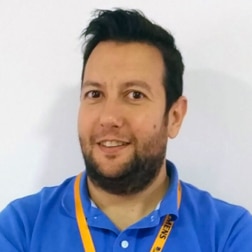
Jesús J. Martínez is a Senior Computer Engineer from the University of Murcia, specialist in Artificial Intelligence. Also, Jesus has a Master in New Technologies in Computer Engineering. He started as research staff in the Intelligent Systems Group of the University of Murcia. He worked in i3Media Spanish project , and in the European FP6 project eCospace: eProfessionals Collaboration Space. He worked with ontologies, Java technologies and data mining in these projects. In the Intelligent Systems Group he made research in recommender systems, personalization of electronic program guides (EPGs), ontologies and data analysis. He researched too on Intrusion Detection Systems. Finally he worked developing an indoor localization system based on Bluetooth technologies using OSGi services. He joined Answare in 2011. In Answare, he is involved in emergency projects, developing a Decision Support System for crisis management and resource optimization (FP7 E-SPONDER and ITEA2 DICOMA).

Antonio Pastorino, born in 1956, responsible for communication and participation working for “Direzione Urbanistica SUE e Grandi Progetti” in the Municipality of Genoa. He has been actively involved in the new urban plan including governance end participation. He has produced descriptive analysis for the General Founding Declaration of the Urban Plan, as well as preliminary projects and studies on urban and environmental urban transformation. He is involved in the Genova Smart City process. He coordinated the Urban Lab project group as well as connections with university, other public bodies and coordinated the work of the citizens in the working groups for participation. He has worked on several European projects including Cat-Med, Urban Empathy and Transform for Smart City.